Jewish History
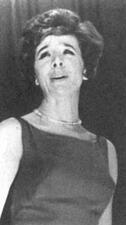
Martha Schlamme
Martha Schlamme was an internationally known singer who rose to prominence after the Second World War due to her phenomenally large repertoire and ability to sing in multiple languages. Schlamme studied piano in Austria before the war and had a successful post-war career in England, singing on BBC radio, before immigrating to the United States and singing in nightclubs and concert halls across the country.
Ruth Schloss
Through her socio-political artworks, Israeli painter Ruth Schloss (1922-2013) directed the viewer's attention to the human conditions of the downtrodden and marginalized in Israeli society from the 1940s through the early 2000s. She depicted figures and images people usually prefer to ignore, such as the poor and the unprivileged, the working class, newcomers, Mizrahi Jews, Palestinian refugees, the disastrous ruins of the wars in Israel, the Intifada in the occupied territories, women and children, newborns, and the elderly.
Eva Schocken
As the daughter of Salman Schocken, founder of Schocken Books, and later as editor and president, Eva Schocken pushed the publishing company to the forefront of both education and women’s studies.

Ottilie Schönewald
Deeply involved in several women’s and Jewish organizations, Ottilie Schönewald was an activist who became a politician to advance her causes. She worked with the League of Jewish Women and helped Jews emigrate from Nazi Germany. After Schönewald and her family fled in 1939, she continued her social work during and after the war.
Regina Schoental
Our knowledge of toxic substances in plants, in fungi, and of aromatic and other chemicals that cause cancer owes much to the pioneering work of Regina Schoental.
Bertha Singer Schoolman
Bertha Singer Schoolman gave a lifetime of service to the betterment of Jewish education and the cause of Youth Aliyah, the movement to bring Jewish youth out of Germany to live in children’s villages in Israel. Schoolman risked her life under fire to help bring convoys to and from kibbutzim.
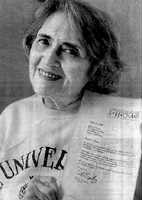
Denise Schorr
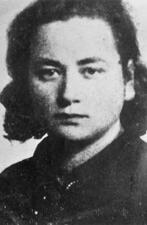
Hela Rufeisen Schüpper
Born to a hasidic family in Krakow, Hela Rufeisen Schüpper joined the Zionist youth movement Akiva against her family’s wishes. When the Germans invaded Poland, Schüpper joined the Jewish resistance against the Nazis, becoming a key courier. She survived Bergen-Belsen and moved to Israel after the war.
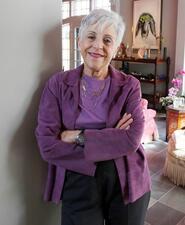
Lynn Schusterman
Billionaire philanthropist Lynn Schusterman changed the landscape of the American Jewish community through her advocacy for Israel, engagement with young Jews, and pioneering funding of inclusion and equality. As Chair of the Charles and Lynn Schusterman Family Foundation, her bold vision and commitment to repairing the world extended from Tulsa, OK, across the American Jewish community, to Israel and the Former Soviet Union.
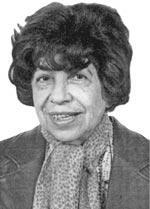
Alice Schwarz-Gardos
As a journalist, editor and foreign correspondent, Alice Schwarz-Gardos wrote articles for German-language newspapers in Israel and Europe from an explicitly Zionist and patriotic point of view. Besides her journalistic work, Schwarz-Gardos published eleven books in German.
Adolphine Schwimmer-Vigeveno
Adolphine Schwimmer-Vigeveno was an active member of the Jewish Women’s Council in the Netherlands in the decades before the outbreak of World War II. She served as the general editor of its periodical and later as its president, stimulating solidarity among Jewish women, organizing Jewish social work, and exploring contemporary Jewish issues, including Zionism.
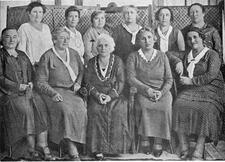
Second Aliyah: Women's Experience and Their Role in the Yishuv
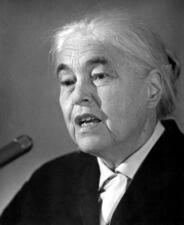
Anna Seghers
Anna Seghers is considered one of the most important German women writers of the twentieth century. Her many novels and stories written during her multiple exiles, including Das siebte Kreuz (1942) adapted into the Hollywood film “The Seventh Cross,” reflect her strong socialist and anti-fascist beliefs, and she remains controversially linked to her later involvement with the East German government.
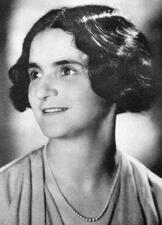
Toni Sender
Toni Sender’s wide-ranging quest to save the world led her from the union hall to the German Parliament (as a socialist) and finally to the United Nations. She helped found Germany’s Independent Social Democratic Party (USPD) and served in the German Parliament from 1924 to 1933. After fleeing to the United States in 1933, she joined the board of the German American Council for the Liberation of Germany from Nazism, and after 1944 she became active with the UN, retiring in 1956.

Sephardi Women in the Dutch Republic
In the early modern period, Dutch Sephardim formed a community famous for its wealth, grandeur, and benevolence.
The article highlights the social, economic and religious position of Sephardi women in the Dutch Republic, arriving as immigrants from persecutions by the Spanish and Portuguese Inquisitions and their offspring, settled in generations afterwards. Their adjustment to normative Judaism is being discussed as well as their professional education and their contributions to Sephardi and Dutch society.

Ada Ascarelli Sereni
Ada Ascarelli Sereni helped thousands of Jews emigrate to Palestine during and after World War II following the death of her husband, a Jewish volunteer for the British army who parachuted into Nazi-occupied Europe.
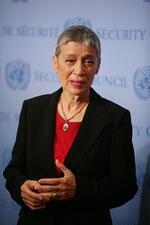
Gabriela Shalev
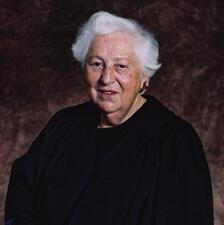
Alice Hildegard Shalvi
Israel Prize Laureate Professor Alice Shalvi was a leading Israeli feminist activist and scholar. Founder of the Israel Women’s Network and the Ben Gurion University English Department and longtime principal of the iconic religious feminist high school Pelech, Professor Shalvi was instrumental in advancing gender issues in Israeli education, society and politics.
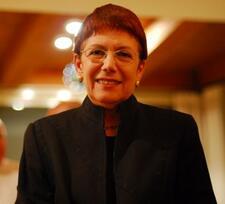
Anita Shapira
Anita Shapira is one of the most important and influential contemporary historians in the field of twentieth-century Jewish and Israeli history. She played important roles in laying the foundations of Israeli historiography and launching the research discipline known today as Israel Studies.
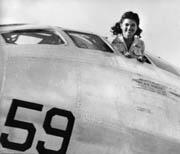
Gertrude Shapiro
She'erit ha-Peletah: Women in DP Camps in Germany
Family played an important role in the lives of Holocaust survivors in DP (displaced persons) camps – in 1947, the birth rate in DP camps was one of the highest in the world. Women served as teachers and eager students, and they were active in the effort to open immigration to Palestine.

Shelamziyyon Alexandra
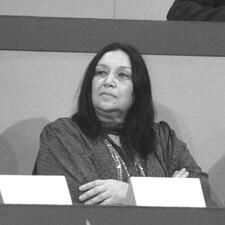
Naomi Shemer
Naomi Shemer was a prolific singer and composer who built a unified Israeli cultural consciousness through her beautiful melodies. From the 1950s to the 1990s, Shemer wrote music that was performed throughout the country, including “Jerusalem of Gold” and “Lu Yehi.” In 1983, she was awarded the Israel Prize, and she continued to write new music until her death in 2004.
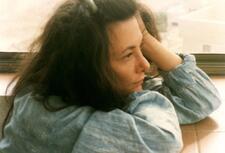
Vicki Shiran
Vicki Shiran was an Egyptian-born Israeli social activist dedicated to feminism, anti-occupation activism, and fighting discrimination against Mizrahim in Israel, all of which she viewed as interconnected. In 1999 she helped found Ahoti, For Women in Israel, which promoted the labor rights of lower-class women in Israel, and in 1981 she led a fierce fight against the Israel Broadcasting Authority for its exclusion of Mizrahim in its telling of the history of the Israeli state.
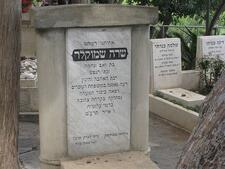
Sarah Shmukler
Sarah Shmukler was a nurse and midwife who emigrated to Palestine from the Russian Empire during the Second Aliyah period. Her short life was characterized by providing medical assistance to migrant workers in Palestine and by close friendships with her fellow pioneers.


